Collection: Palm Plants
-
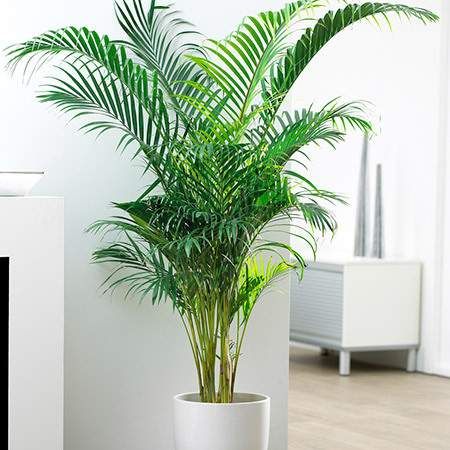 Sale
SaleAreca Palm - Plant
Regular price Rs. 399.00Regular priceUnit price / perRs. 1,500.00Sale price Rs. 399.00Sale -
Chamaedorea Seifrizii, Bamboo Palm 3-4 Feet Plant
Regular price Rs. 499.00Regular priceUnit price / perRs. 1,100.00Sale price Rs. 499.00Sold out -
Table palm, Umbrella Palm - Plant
Regular price Rs. 599.00Regular priceUnit price / perRs. 999.00Sale price Rs. 599.00Sale -
Chamaedorea Elegans, Parlour Palm - Plant
Regular price Rs. 499.00Regular priceUnit price / perRs. 600.00Sale price Rs. 499.00Sale -
Cycas Plant, Sago Palm, Cycas revoluta - Plant
Regular price Rs. 499.00Regular priceUnit price / perRs. 2,699.00Sale price Rs. 499.00Sale -
Pony Tail Palm, Beaucarnea Recurvata - Plant
Regular price Rs. 599.00Regular priceUnit price / perRs. 1,299.00Sale price Rs. 599.00Sale -
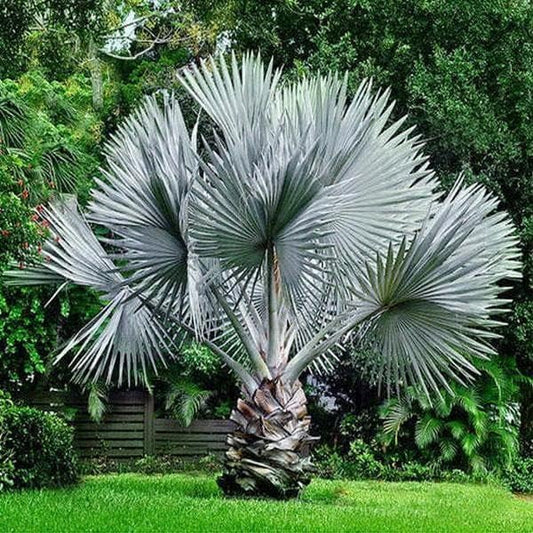 Sold out
Sold outBismarckia Palm - Plant
Regular price Rs. 499.00Regular priceUnit price / perRs. 599.00Sale price Rs. 499.00Sold out -
Palm: Yellow Cane Palm - Plant
Regular price Rs. 599.00Regular priceUnit price / perRs. 999.00Sale price Rs. 599.00Sale -
Red Latan Palm, Latania Lontaroides - Plant
Regular price Rs. 3,000.00Regular priceUnit price / perRs. 249.00Sale price Rs. 3,000.00Sold out -
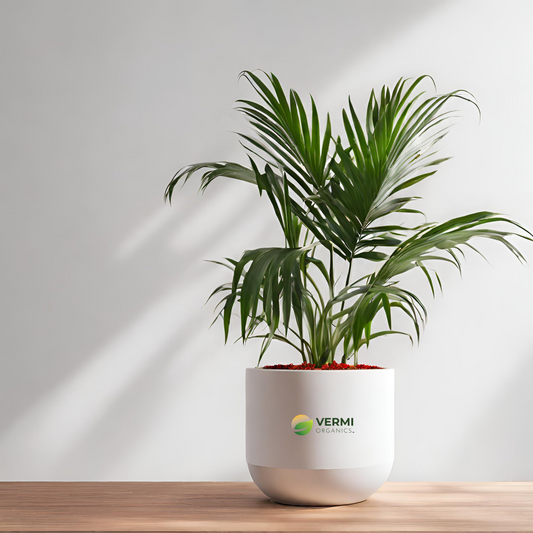
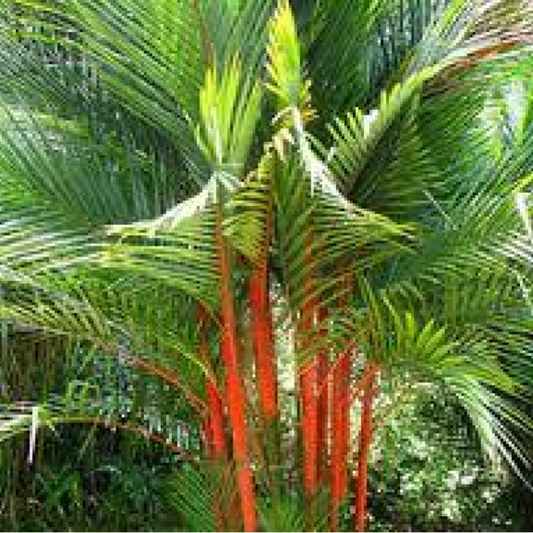 Sold out
Sold outRed Neck Palm - Plant
Regular price Rs. 299.00Regular priceUnit price / perRs. 399.00Sale price Rs. 299.00Sold out -
Royal Palm, Roystonea regia - Plant 3 Feet
Regular price Rs. 799.00Regular priceUnit price / perRs. 899.00Sale price Rs. 799.00Sale -

 Sold out
Sold outDate Palm - Plant
Regular price Rs. 1,399.00Regular priceUnit price / perRs. 1,599.00Sale price Rs. 1,399.00Sold out -

 Sold out
Sold outCluster Palm - Plant
Regular price Rs. 299.00Regular priceUnit price / perRs. 359.00Sale price Rs. 299.00Sold out -
Acoelorraphe wrightii (paurotis palm) - Plant
Regular price Rs. 1,599.00Regular priceUnit price / perRs. 1,999.00Sale price Rs. 1,599.00Sold out -
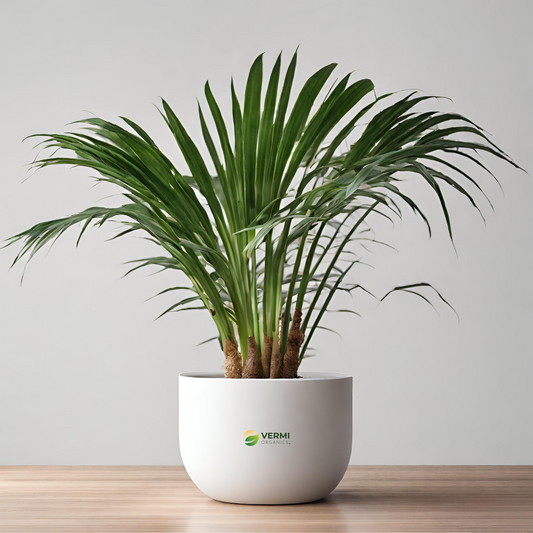
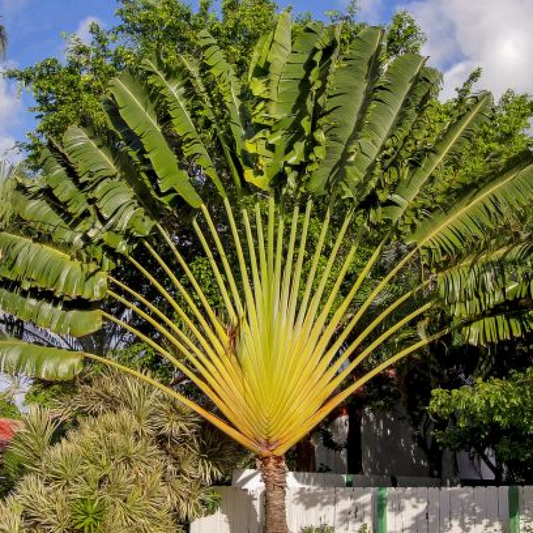 Sold out
Sold outTravellar Palm - Plant
Regular price Rs. 299.00Regular priceUnit price / perRs. 399.00Sale price Rs. 299.00Sold out -
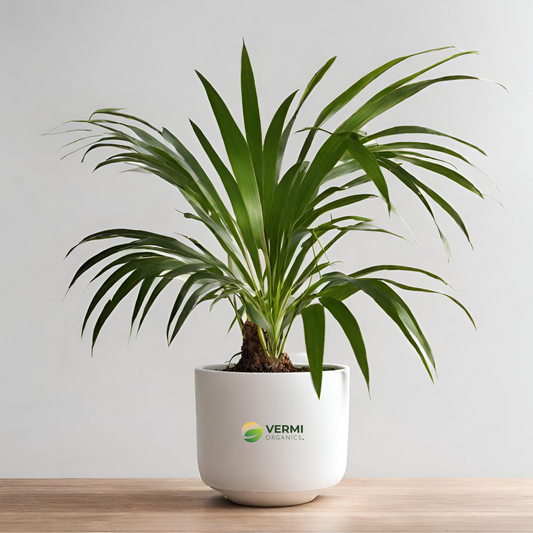
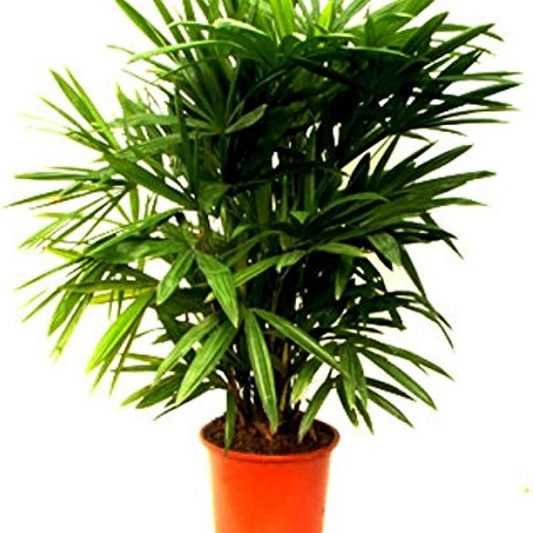 Sold out
Sold outRaphis Palm, Lady Palm - Plant
Regular price Rs. 499.00Regular priceUnit price / perRs. 599.00Sale price Rs. 499.00Sold out -
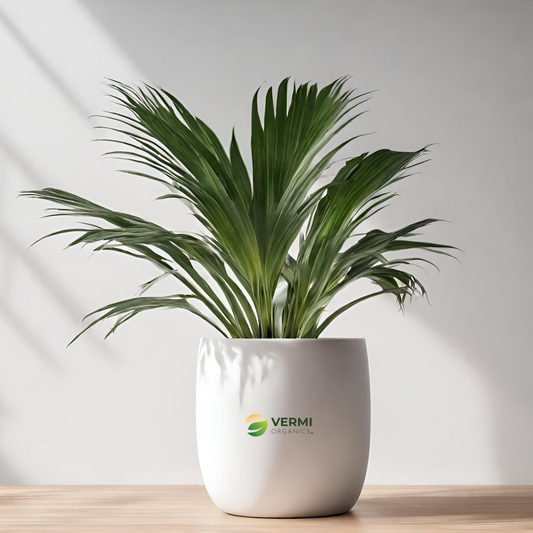
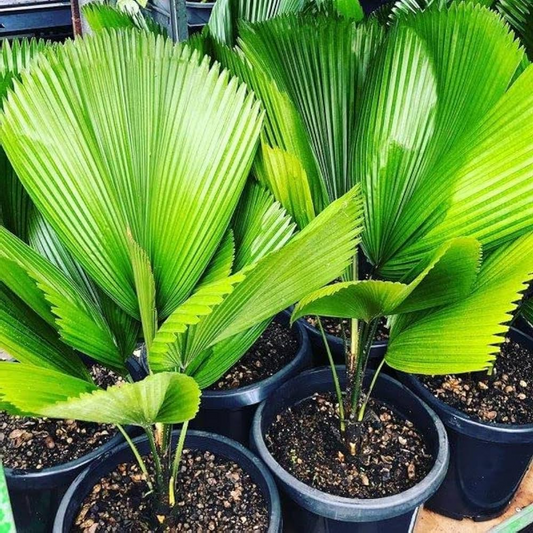 Sold out
Sold outRuffled latan palm. - Plant
Regular price Rs. 299.00Regular priceUnit price / perRs. 399.00Sale price Rs. 299.00Sold out -
Pichodia grandis, Ruffled fan palm, Palas payung, Licuala grandis - Plant
Regular price Rs. 299.00Regular priceUnit price / perRs. 399.00Sale price Rs. 299.00Sold out -
Pygmy Date Palm, Phoenix Roebelenii Palm - Plant
Regular price Rs. 1,999.00Regular priceUnit price / perRs. 2,199.00Sale price Rs. 1,999.00Sold out -
King Palm, Archontophoenix Alexandrae - Plant
Regular price Rs. 299.00Regular priceUnit price / perRs. 350.00Sale price Rs. 299.00Sold out
Palm Plants
Buy Palm Plants Online: Elevate Your Space with Timeless Elegance
Introduction to Palm Plants:
Palm plants have long been revered for their iconic appearance and ability to instantly transform any space into a tropical oasis. With their graceful fronds and architectural beauty, palm plants add a touch of exotic charm to both indoor and outdoor environments. At Vermi Organics, we offer a diverse selection of palm plants available for purchase online, allowing you to bring the beauty of the tropics into your home or garden with ease.
About Palm Plants:
Palm plants belong to the Arecaceae family and encompass a wide variety of species, each with its own unique characteristics and growth habits. From the classic Majesty Palm to the elegant Areca Palm, palm plants come in a range of sizes, shapes, and colors, making them versatile additions to any landscape or interior decor scheme.
Benefits of Palm Plants:
Beyond their aesthetic appeal, palm plants offer a host of benefits for both physical and mental well-being. They are natural air purifiers, filtering out toxins and pollutants from the air to create a healthier indoor environment. Additionally, the presence of palm plants has been shown to reduce stress levels and promote relaxation, making them ideal for creating tranquil and inviting spaces.
Types of Palm Plants:
Palm plants can be categorized into two main types: indoor and outdoor palms. Indoor palms, such as the Kentia Palm and Parlor Palm, thrive in low-light conditions and make excellent houseplants. Outdoor palms, such as the Windmill Palm and Canary Island Date Palm, are more suited to garden landscapes and require ample sunlight and space to flourish.
Care Tips for Palm Plants:
Proper care is essential for ensuring the health and longevity of palm plants. Here are some key care tips to keep in mind:
- Light: Place indoor palm plants in bright, indirect sunlight, while outdoor palms prefer full sun to partial shade.
- Watering: Water palm plants thoroughly when the top inch of soil feels dry to the touch, and ensure proper drainage to prevent waterlogging.
- Soil: Use a well-draining potting mix for indoor palms, and amend garden soil with organic matter for outdoor palms.
- Fertilization: Feed palm plants with a balanced fertilizer formulated for palms every 2-3 months during the growing season.
- Pruning: Remove dead or yellowing fronds regularly to maintain the plant's overall health and appearance.
- Pest Control: Monitor palm plants for common pests such as spider mites and scale insects, and treat infestations promptly with natural or organic remedies.
Common Names of Palm Plants:
Palm plants are known by a variety of common names, depending on their species and origin. Some popular common names include:
- Majesty Palm (Ravenea rivularis)
- Areca Palm (Dypsis lutescens)
- Parlor Palm (Chamaedorea elegans)
- Windmill Palm (Trachycarpus fortunei)
- Canary Island Date Palm (Phoenix canariensis)
- Lady Palm (Rhapis excelsa)
Specifications of Palm Plants:
Palm plants vary in size, growth habit, and foliage characteristics, making them suitable for a wide range of applications. Here are some common specifications to consider when selecting palm plants:
- Height: Palm plants can range from a few feet tall for indoor varieties to towering specimens that reach heights of 30 feet or more in their natural habitat.
- Growth Rate: Some palm plants grow slowly, while others have a more rapid growth rate, requiring regular pruning to maintain their size and shape.
- Foliage: Palm plants feature a diverse array of foliage types, including fan-shaped, feather-shaped, and pinnate leaves, each adding a unique texture and visual interest to the plant.
Special Features of Palm Plants:
Palm plants are prized for their resilience, adaptability, and striking appearance. Some special features of palm plants include:
- Architectural Foliage: Palm plants boast elegant fronds that add a dramatic architectural element to any landscape or interior setting.
- Drought Tolerance: Many palm plants are drought-tolerant once established, making them ideal for low-maintenance landscaping in arid climates.
- Tropical Aesthetic: With their lush foliage and tropical vibes, palm plants evoke feelings of relaxation and escapism, transforming ordinary spaces into exotic retreats.
Uses of Palm Plants:
Palm plants have a wide range of uses, both indoors and outdoors. Some common uses include:
- Interior Decor: Palm plants are popular choices for adding a touch of greenery and sophistication to interior spaces, such as living rooms, offices, and atriums.
- Landscaping: Outdoor palm plants are used to create lush, tropical landscapes in gardens, parks, and public spaces, providing shade, privacy, and visual interest.
- Special Events: Palm plants are often used as decorative accents for weddings, parties, and other special events, lending a touch of natural beauty and elegance to the occasion.
Conclusion: Buy Palm Plants Online with Confidence
Transform your space into a tropical paradise with the timeless beauty of palm plants from Vermi Organics. Whether you're looking to create a lush indoor jungle or a vibrant outdoor oasis, our diverse selection of palm plants has you covered. With our convenient online
FAQ's
What are Palm plants?
Palm plants are a diverse group of tropical and subtropical plants characterized by their iconic palmate or feather-like leaves and striking appearance.
Where can I buy Palm plants online?
You can buy Palm plants online from reputable nurseries and plant retailers such as Vermi Organics, offering a variety of Palm species and hybrids.
Are Palm plants suitable for indoor environments?
Yes, many Palm plants are well-suited for indoor environments, provided they receive adequate light, water, and humidity.
What types of Palm plants are suitable for indoor cultivation?
Common indoor Palm plants include the Majesty Palm, Areca Palm, Parlor Palm, and Kentia Palm, among others.
How often should I water my Palm plants?
Palm plants generally prefer consistently moist but not waterlogged soil. Water them when the top inch of soil feels dry to the touch.
Do Palm plants require special fertilizer?
Palm plants benefit from regular fertilization with a balanced fertilizer formulated specifically for Palm plants.
Can Palm plants tolerate low light conditions?
While some Palm plants can tolerate lower light conditions, most prefer bright, indirect sunlight for optimal growth.
How can I increase humidity for my indoor Palm plants?
Increase humidity for indoor Palm plants by misting them regularly with water or placing them near a humidifier.
Can Palm plants be grown outdoors?
Yes, many Palm plants are well-suited for outdoor cultivation in tropical or subtropical climates.
What types of Palm plants are suitable for outdoor landscapes?
Outdoor Palm plants include the Windmill Palm, Canary Island Date Palm, Mexican Fan Palm, and Sago Palm, among others.
How tall do Palm plants typically grow?
The height of Palm plants varies depending on the species and growing conditions. Some can reach heights of 30 feet or more, while others remain relatively small.
Do Palm plants require pruning?
Yes, Palm plants may require occasional pruning to remove dead or yellowing fronds and maintain their overall health and appearance.
Are Palm plants safe for pets?
While Palm plants are generally considered non-toxic to pets, it's best to keep them out of reach of curious animals to prevent ingestion.
How fast do Palm plants grow?
The growth rate of Palm plants varies depending on factors such as species, environmental conditions, and care practices.
Can Palm plants be propagated at home?
Yes, Palm plants can be propagated through methods such as seed propagation, division, and offshoot propagation.
What pests and diseases are Palm plants susceptible to?
Palm plants may be susceptible to pests such as spider mites, scale insects, and mealybugs, as well as diseases such as root rot and leaf spot.
Do Palm plants require repotting?
Palm plants may need to be repotted periodically as they outgrow their containers or when the soil becomes depleted of nutrients.
Can Palm plants tolerate drought conditions?
While some Palm plants are drought-tolerant once established, most prefer consistently moist soil and regular watering.
How can I prevent yellowing leaves on my Palm plants?
Yellowing leaves on Palm plants may be caused by overwatering, underwatering, or nutrient deficiencies. Ensure proper watering and fertilization practices to prevent leaf yellowing.
Can Palm plants be grown in pots or containers?
Yes, many Palm plants can be grown successfully in pots or containers, provided they have adequate drainage and room for root growth.
How do I know if my Palm plant is getting enough light?
Signs that your Palm plant may not be getting enough light include pale or yellowing leaves, stunted growth, and leggy appearance.
Are Palm plants suitable for beginners?
Yes, many Palm plants are relatively easy to care for and are suitable for beginners who are new to indoor or outdoor gardening.
Can Palm plants be grown indoors without natural sunlight?
While Palm plants prefer natural sunlight, they can tolerate lower light conditions indoors, provided they receive adequate artificial light from grow lights or fluorescent lamps.
How can I prevent pests and diseases in my Palm plants?
Prevent pests and diseases in Palm plants by practicing good sanitation, avoiding overwatering, and inspecting plants regularly for signs of infestation or disease.
Can Palm plants be used in landscaping?
Yes, Palm plants are popular choices for landscaping in tropical and subtropical regions, where they can be used to create lush, exotic gardens and provide shade, privacy, and visual interest.






































